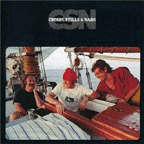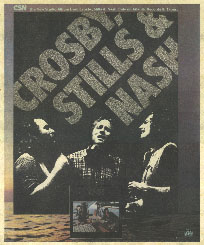![]()
  |

CSN
Crosby, Stills and Nash
Atlantic SD19104
Released: June 1977
Chart Peak: #2
Weeks Charted: 33
Certified Platinum: 8/18/77
What's so instantly striking about Crosby, Stills and Nash's CSN, their second group album in eight years, is that it sounds os much like the debut LP even though its makers are so vastly changed. Since CS&N, and later Y, were always at the vanguard of the conspicuous counterculture (always ready to hoist their tie-dyed freak flag at a moment's notice), their current reflection and hesitancy are especially interesting. And, because the music is so eerily familiar, the album communicates a kind of time warp (imagine if we knew in 1969 what we know now) that's compelling and troubling.
Those who have been put off in the past by Graham Nash's moralizing, David Crosby's precious intellectualizing and Stephen Stills' brash solipsism are going to be relieved to find all three musicians dramatically grown up -- but not at all smug. Nearly all of the album's material is disconsolate -- full of disillusionment and identity confusion -- but it's honest and surprisingly humble.
 Click image for larger view. |
Graham Nash's political attitudinizing has always struck me as quixotic, but here it's by turns more cosmic and more personal and a great deal more engaging. His "Cathedral" will undoubtedly by perceived by some as the album's centerpiece, and its sprawling dream-time grappling with religion and its powerful musical buildup are superficially impressive. But what CSN is about is the passage of time, and Nash deals with this brilliantly, albeit morosely, in his three other compositions. "Just a Song Before I Go" evokes a short-lived relationship not by describing the feelings of individuals, but by painting the moment of release, without tears. In "Cold Rain," an almost frighteningly dolorous song, he can't comprehend the purpose of the people he watches passing by. And in "Carried Away" he checks adulterous impulses when a couple drifts by "leaving me here." He's unable to seize the moment; it slips by: "Part of me is screaming to say/I want to be carried away."
Though CSN's wistfully unhappy tone leaves its music a mite depressing, the fusion of talents is an extremely happy one. Stills' Latin rock breaks up Nash and Crosby's contemplative music without obtruding, and his voice adds a masculinity lacking in the pair's post-CS&N work. Indeed, Stills prevents Crosby and Nash from being cloying, and they restrain from his usual stridency. They are not imitating their original sound -- all have been through too long an evolution, musically and personally, to be the cute, absurdly optimistic vocal group that arose with the Sixties' slow downshift. They spawned a generation of imitators and admirers -- America, Loggins and Messina, even the Grateful Dead for a time -- and pretty much shaped the group approach to harmonies in the Seventies. In the end, though, as I think CSN proves, Crosby, Stills and Nash are not about a technique, but about the effect three people have on each other.
- Peter Herbst, Rolling Stone, 8/11/77.
Bonus Reviews!
Unlike Neil Young's newest effort, American Stars and Bars, which has at least one winner in the package ("Like a Hurricane," one of the epic guitar workouts that are his trademark), CSN has no redeeming virtue whatsoever. It is perhaps the worst single record from a group with a major reputation since Creedence's Pendulum. Of course, to call these three guys a "group" at this point is to abuse the language. Sure, they still sing together, but they don't write together, and they do hardly any playing at all -- the arrangements and overall sound of the thing are dominated by the session hacks they've dragged along from their solo outings. It wasn't always that way. If you go back to Crosby, Stills and Nash and Déjà Vu, you'll notice that, with the exception of an occasional guest solo, they took justifiable pride in doing everything themselves, even if it meant that Stills had to overdub layers of guitar, his own bass, and multiple keyboards. Today, apparently stricken with terminal L.A. torpor, they probably haven't a clue that they have forfeited the last vestiges of individuality by using hired hands.
As for the songs, they're hardly worth discussing. Both Stills and Crosby seem incapable of rewriting even themselves with any panache ("See the Changes," for example, is "Helplessly Hoping" taken sort of sideways), and Nash, once a purveyor of irresistible light pop fluff, is now dealing in imitation Jethro Tull. "Cathedral" (that's Winchester Cathedral, if you can believe it), is a clumsy swipe at the hypocrisy of organized religion, but there's no heart in it.
With a fan's eternal optimism I had allowed myself to hope that this record (and Young's newest too) might be better. But the incontrovertible proof is here: when the thrill is gone, it's gone for good. Which means, I guess, that in a perverse sort of way we've been taught a valuable lesson, so thanks a lot, guys.
- Steve Simels, Stereo Review, 9/77.
This is touched with a certain elegance, but it is also rather ponderously tuneless. That doesn't matter so much when a mood is working, as happens in "To the Last Whale," but overall it blurs some not-that-bad lyrics and gives the album an abstract, detached, disinterested feel. David Crosby, whose lyrics are slightly more sophisticated, has written, it says here, some tunes that are so vague and rambling you wonder if even he could play them, by ear, the same way twice. Graham Nash's melodies have beginnings, middles, and ends, but they are stale and utterly predictable. The voices, of course, sound good together (Nash sounds better with Crosby than without him), and the instrumental backing -- while it won't surprise anyone who heard Crosby, Stills and Nash -- employs some of James Taylor's associates and is clean, thorough, and nicely detailed. My impression is that it's a gentle, earnest, well-meaning album that just never lights up and becomes musical.
- Noel Coppage, Stereo Review, 2/76.
The long-awaited reunion of the pioneers of big-selling flashy vocal harmonies soft-rock has finally taken place during the winter in Miami. The boys sound as good as ever, with their spectacular wide-space harmonizing on their own quirky, rueful ballads. The themes of the songs have changed somewhat from cultural youth rebellion pains to the more subtle problems of retaining love and creativity as one reaches full adulthood. Except for the more mature thoughtfulness of the lyrics, this LP could well be a vault release from masters made during the trio's heyday. The joy the threesome must feel at being able to once again create such beautiful rock sounds comes across clearly with the gusto of the performances. Crosby, Stills & Nash have returned to their brilliant roots with all strength intact. Best cuts: "Shadow Captain," "Dark Star," "Just A Song Before I Go," "See The Changes."
- Billboard, 1977.
Wait a second -- wasn't this a quartet? D+
- Robert Christgau, Christgau's Record Guide, 1981.
A fair and somewhat slick reprise, highlighted by "Dark Star." A valiant attempt to re-create the good spirits of the first album amid the malaise of the '70s. * * *
- Bruce Eder, The All-Music Guide to Rock, 1995.
![]() Reader's Comments
Reader's Comments
No comments so far, be the first to comment.